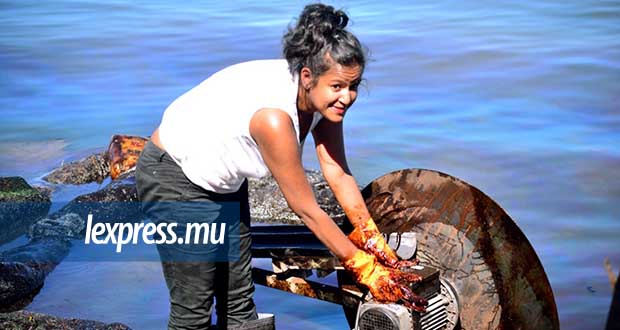Publicité
“MV Wakashio” story through the eyes of Reshmi
Par
Partager cet article
“MV Wakashio” story through the eyes of Reshmi

It’s windy. I’m not sure if these winds are generated by the Southeast Trade Winds. Those were winds explained in our Geography classes.
My name is Rheshmi. I’m now 57 years old. I sell gato dhall near the market. My husband was working on sand extraction but now he is a fisherman. He does not sell his ‘catch of the day’. Robert does. Robert was the campaign manager of the minister of Tourism and he has gained access to the biggest chain of hotels.
Robert is in dire condition; hotels are shut down. So, so is my husband. If my husband is in need, my revenues are diverted. It’s one-way traffic. Just like life.
Rheshmi has been wearing the same sari for one week. Across the road, the roti maker, Tangetty, is watching every move she makes. In Mahébourg, life is like that. I meant life was like that, before. Before the Wakashio.
Where I live there is a Wakashio watershed, a pre-Wakashio, and the aftermath of Wakashio, which I will depict as Rheshmi. Life is a stage, but life is a fiction larger than fiction itself...
Pre-Wakashio, Mahébourg was always crowded with either its residents or tourists who’d travel hours to come visit. The abundance of people walking around, exploring, would help as they were always so intrigued by our street food. I was able to make a living out of selling gato dhall, it was not a lot, but it was enough.
My husband would bring more to our household financially. Being a fisherman helps to fill up the financial gap. When the sea is favourable, he would be able to catch up to 20 kg of fish which would sell nicely to the hotels. The hotels used to pay a decent amount for fresh fish as they have a reputation to maintain when it comes to tourists visiting.
Life before the Wakashio had its ups and down, but it was bearable. I remember the day it all happened.
The grounding occurred on the 25th of July 2020 but the oil did not start leaking immediately. That’s what my husband, who knows the sea like a child knows his Nintendo Switch video game, explained to me. Later, the news they reported that the MV Wakashio was stuck on the reefs and that experts were dreading an oil spill.
The dreaded oil spill started on the August 6, 2020. At that time the authorities were trying to control the spill and had already started isolating sensitive areas of the coast. Foreign countries were asked to help pump out an estimated 3,890 tons of very low sulphur fuel oil which was on board. However, despite the attempts of the government to control the oil spill, an estimated 1,000 tons of oil spilled into the ocean.
Following such a catastrophe, several NGOs rushed to help by making booms to keep the oil from spreading further at sea. While helping with my husband to make the booms, I remember the solidarity of all Mauritians on that day. Everyone was lending a hand to face that ecological disaster. In the process, many of the residents of Mahébourg were in direct contact with the oil which led to health complications. Till date, they still have a skin condition which needs treatment.
While everyone helped to make sure the oil didn’t spread, the aftermath of the oil spill still brought death. Many dolphins were found dead at the coast, followed by fishes and even birds. This is what has brought my family such hardships. My husband, who would go fishing to then sell to the hotels, was now faced with a difficult situation. Following the oil spill, the government restricted the area and forbade the fishermen from doing their activities until further notice. It is only after a year that the fishermen, my husband included, were able to start their normal activities again.
The year following the oil spill was hard and difficult. I had to work extra hours to meet the financial needs of my family. While the government was expected to give the fishermen a monthly compensation, we only received the money for a couple of months. To add to our troubles, Covid-19 hit us and lockdowns followed which only made it harder to get through life.
Now, exactly a year later, with no lockdowns and a horrible memory of the Wakashio oil spill, life is taking its shape anew, adjusting, adapting, accepting the “new normal”. Though it will be a few years until everything goes back to normal, the fishermen have started to go back to sea. Despite the noticeable changes when it comes to the number of fishes being caught, they are doing their best. My husband believes that the oil spill scared the fishes away and that it will take time for them to come back... While another fellow fisherman believes that the fishes are scarce because of the winter season. He expects the fish to be back in summer. Personally, I hope he is right.
In the meantime, I am still selling gato dhall at the market, waiting for better days. My husband and other fellow fishermen accompanied by NGOs went to commemorate the site where the Wakashio went aground. Flowers were offered. I am assuming it is a way to mark a year of the Wakashio and to pray that such a disaster does not hit our beloved island once again. Mauritius is known for its beaches and the numerous shades of turquoise of the lagoons and white reefs, and many more. Preserving it from disasters is the duty of every Mauritian.
Reshmi V
Publicité
Publicité
Les plus récents






